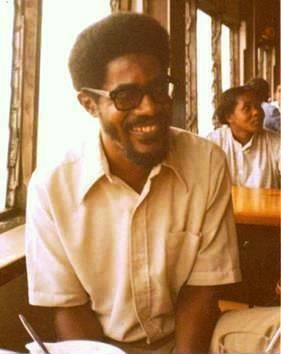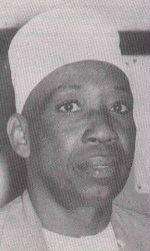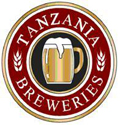Related Research Articles

Dar es Salaam is the largest city and financial hub of Tanzania. It is also the capital of Dar es Salaam Region. With a population of over six million people, Dar es Salaam is the largest city in East Africa and the sixth-largest in Africa. Located on the Swahili coast, Dar es Salaam is an important economic centre and is one of the fastest-growing cities in the world.

Walter Anthony Rodney was a Guyanese historian, political activist and academic. His notable works include How Europe Underdeveloped Africa, first published in 1972. Rodney was assassinated in Georgetown, Guyana, in 1980.

Shaaban bin Robert, also known as Shaaban Robert, was a Tanzanian poet, author, and essayist who supported the preservation of Tanzanian verse traditions. Robert is celebrated as one of the greatest Tanzanian Swahili thinkers, intellectuals and writers in East Africa and has been called "poet laureate of Swahili" and is also known as the "Father of Swahili." He is also honoured as the national poet.

The White Fathers, officially the Missionaries of Africa abbreviated MAfr), are a Roman Catholic society of apostolic life of Pontifical Right founded in 1868 by then Archbishop of Algiers Charles-Martial Allemand-Lavigerie. The society focuses on evangelism and education, mostly in Africa. In 2021, there were 1428 members of the Missionaries of Africa of 36 nationalities, working in 42 countries, in 217 communities.

The United Progressive Party (UPP) was a political party in Zambia. The current president of the party is Saviour Chishimba.

Mark James Mwandosya is a Tanzanian CCM retired politician and a former Member of Parliament for Rungwe East constituency, who is currently serving as the chairman of the Board of Directors of Ewura Tanzania and the chairperson of the Energy Regulators Association of East Africa Annual General Assembly.
The Lungu are a tribe of two Bantu ethnic groups i.e. the Lungu of Chief Tafuna (Mambwe-Lungu) and the Lungu of Chief Mukupa Kaoma (Malaila-Lungu). The Mambwe Lungu, who are the main focus of this article are located primarily on the southwestern shores of Lake Tanganyika in Rukwa Region's Kalambo District, Tanzania and northeastern Zambia mainly in Mpulungu and Mbala district. In 1987 the Lungu population in Tanzania was estimated to number 34,000. The number of Lungu in Zambia has not been independently estimated, though the combined number of Mambwe and Lungu in Zambia was estimated to be 262,800 in 1993.

The earliest evidence of Hinduism in Tanzania is from the 1st millennium AD when there was trade between East Africa and Indian subcontinent. Most of these traders came from Gujarat, Deccan and the Chola empire. Archaeological evidence of small Hindu settlements have been found in Zanzibar and parts of Swahili coast, Zimbabwe and Madagascar.
The Chitimukulu is the King or Paramount Chief of the Bemba, the largest ethnic group in Zambia. All Chitimukulus, as well as lesser Bemba chiefs, are members of the Bena Ng'andu. Potential successors to the ruling Chikimukulu are chosen from the various Bemba chiefs.
Mwaiseni is a mining company in Tanzania; it specializes in the mining of gemstones. Mwaiseni Stores Ltd. was a Zambian business. Henry Susman was the Managing Director.

Margaret Joy Tibbetts was an American diplomat. A career Foreign Service Officer, she was the United States Ambassador to Norway from 1964 to 1969 under President Lyndon Johnson. She attended Gould Academy, Wheaton College in Massachusetts and her Ph.D. from Bryn Mawr College. She was awarded an honorary degree from Bates College in 1962 and Bowdoin College in 1973.
Fipa is a Bantu language of Tanzania. It is spoken by the Fipa people, who live on the Ufipa plateau in the Rukwa Region of South West Tanzania between Lake Tanganyika and Lake Rukwa. The ethnic group of the Fipa people is larger than the group of Fipa language speakers. On the Tanzanian side, people who speak Mambwe-Lungu may identify as Fipa and consider their language to be a dialect of Fipa. Lungu and Mambwe are also spoken in Zambia where they are considered languages and their speakers are considered to be ethnic groups in their own right, although linguists consider Lungu and Mambwe to be dialects of a single language. There are three dialects: Milanzi, Kwa (Ichikwa) and Nkansi.
The Railway African Workers' Union (R.A.W.U.) was a trade union in Rhodesia which represented black African railway workers employed by the Rhodesian Railways.
This page details the process of qualifying for the 1970 African Cup of Nations.
The following is a timeline of the history of the city of Dar es Salaam, Tanzania.

Tanzania Breweries Limited, also referred to as TBL, is the oldest and largest brewing company in Tanzania.
Malangali Secondary School was one of the leading academic institutions in colonial Tanganyika. It retained its reputation for academic excellence after Tanganyika won independence from Britain in December 1961.

WPP-Scangroup is a subsidiary of WPP and is listed on the Nairobi Securities Exchange. It is the largest marketing and communication group operating a multi-agency model across multiple disciplines in Sub-Saharan Africa. The group comprises the ad agencies Ogilvy Africa, SCANAD, JWT and BluePrint Marketing; media firms GroupM, MediaCom Africa, Mindshare and MEC; public relations agencies Ogilvy PR and H+K Strategies; market research agency Millward Brown; specialty communication firms Roundtrip and Geometry Global; and digital companies OgilvyOne, Squad Digital and SCANAD Digital. In all, over 1200 people are employed across the various organizations.

The Tanzam Highway leads from Lusaka in Zambia to Dar es Salaam in Tanzania. The highway was built from 1968 to 1973 in several stages and was intended to provide seaport access for Zambia and to expand the transport options for Zambia, Malawi and the then Zaire.
Amini Aza Mturi was a Tanzanian archaeologist and director of the Tanzanian Division of Antiquities between 1968 and 1981. He has been described as "one of the founding fathers of archaeology in Tanzania".
References
- ↑ Jan-Bart Gewald; Marja Hinfelaar; Giacomo Macola, eds. (2011). "Dedication". Living the end of empire: Politics and society in late colonial Zambia. Brill. p. vi.
- ↑ McCracken, John (2011). "Andrew D. Roberts: An appreciation". In Jan-Bart Gewald; Marja Hinfelaar; Giacomo Macola (eds.). Living the end of empire: Politics and society in late colonial Zambia. Brill. pp. ix–xii.